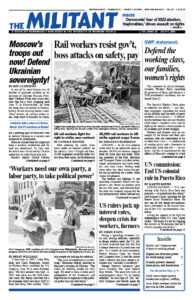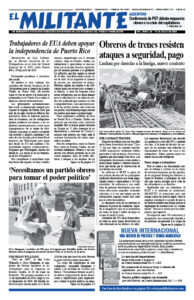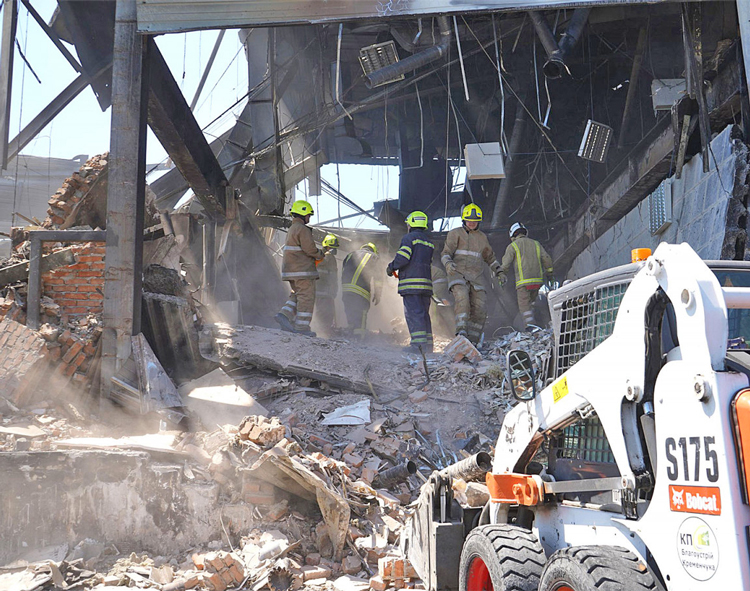In one of his most brazen acts of murder of innocent civilians in his invasion of Ukraine, Russian President Vladimir Putin sent cruise missiles that hit a busy shopping mall June 27 in Kremenchuk, far from the front lines of combat in Donbas, killing 20 and injuring dozens more. These attacks on civilian urban areas, from Kyiv to Kharkiv to Odesa, are a growing part of Moscow’s war to destroy Ukraine as a country and reimpose its domination.
Moscow claimed that the target had been a military installation and the mall was abandoned. Or, they said, the attack was carried out by Ukraine authorities to make Putin look bad.
Russia’s deputy United Nations ambassador claimed the Kremenchuk attack was “a new Bucha-style Ukrainian provocation.” There was a brutal occupation of the Bucha suburb of Kyiv in March by Russian forces before they were driven out. The Kremlin tried a similar cover-up there after the exposure of killings and abuse of residents perpetrated by Moscow’s military command.
In response, Ukraine President Volodymyr Zelensky called on the United Nations to organize an international visit to the mall, saying it would see that “this is a calculated Russian strike, exactly at this shopping mall.”
Since the determined Ukrainian defense thwarted Moscow’s initial invasion thrust against Kyiv, and then Kharkiv, Russian military efforts have focused in the country’s east, where they have shorter, more direct supply lines. Russian forces there are carrying out a murderous assault by artillery, leveling whole cities and villages, then occupying what’s left. They have inched ahead in the Donbas region, but with heavy losses.
After a massive artillery and aircraft bombardment turned much of the city to rubble, Russian forces finally captured Severodonetsk June 24 when Kyiv withdrew its remaining troops. Moscow is now showering a withering artillery barrage against Lysychansk, on higher ground across the river and the last major city in Luhansk yet to be occupied by Russian forces.
These battles are taking a heavy toll on both armies. Moscow keeps shifting commanding officers in frustration over the slow pace of advances and continuing demoralization among Russian troops. Gen. Alexander Dvornikov — who reportedly took command of Moscow’s invasion with the shift to focusing on Donbas —hasn’t been seen publicly for weeks. Col.-Gen. Genady Zhidko appears to now be on the hot seat, the Moscow Times reported June 29.
Fissures in imperialist ‘world order’
The war — the largest on European soil since the Second World War — has heightened shifts and fissures in the imperialist “world order” that emerged from that war, with Washington as top dog.
As recent battles raged, imperialist leaders held G-7 and NATO summits in Europe.
Leaders of the Group of Seven wealthy capitalist countries — Canada, France, Germany, Italy, Japan, the U.K. and the U.S. — met in Bavaria, Germany, June 26-28, followed by a larger NATO gathering in Madrid.
The pretense of unity among these alliances, all heavily dependent on Washington, is increasingly strained as the war drags on. The rulers face their own crises and divisions at home, and are seeking the best path to defend their own imperialist interests, markets and profits. All are embarked on expanding their military capability.
Russian President Vladimir Putin is relying on these frictions and on “war fatigue” among the major capitalist powers to weaken their moves to stand by Ukraine.
The June 28-30 NATO summit for the first time included Australia, Japan, New Zealand and South Korea. This reflected that while making a show of wide support to Kyiv, all these capitalist governments are increasingly focused on the rising challenges posed by Beijing.
President Joseph Biden announced a new escalation of the U.S. “force posture” in Europe to bolster its place as the key European power. This includes a permanent U.S. army headquarters in Poland, a “rotational brigade” in Romania of 5,000 troops and “more defense and other capabilities” in Germany, Italy and the Balkans.
Like its European imperialist rivals, Washington’s goal is to be in a position to force a deal to its advantage onto the Ukrainian government when the time is right.
Openings for fraternization
The Kremlin is scrambling to recruit men to fight in Ukraine after heavy losses in the first months of the invasion. The Putin regime hasn’t been able to impose a general draft because it would have to admit that this is a protracted war that it isn’t winning, not the “special military operation” painted in state media.
Recruitment offices across Russia are popping up to lure reservists and others into contracts with pay offers and bonuses, up to six times the median Russian salary of $600 a month.
One Russian worker, Vadim Shatrov, who signed up, wrote in his online diary that he enlisted both for financial reasons and because of his patriotic views. Within two days, he was assigned to the 138th motorized rifle brigade in the Belgorod region on a three-month contract.
“The way I see it,” he wrote, “I’m not going to fight against ordinary Ukrainians; I’m going to fight with NATO, Nazis and terrorists!”
But as he got closer to the Ukrainian border, he grew more disenchanted. Fellow volunteers returning from “behind the ribbon,” slang for being in Ukraine, told him horrifying war stories. He said, “Out of the four people from Yaroslavl, only one guy came back. He said his commanders abandoned them there.”
“We’ve had several hundred requests from people who wanted to sever their contract prematurely,” said Sergei Krivenko, director of the human rights group Citizen. Army. Law. “They say the war is brutal, and it’s not clear to them what they are doing there and who they are fighting against.”
Examples like this show the potential for fraternization between Ukrainian and Russian workers, including those in uniform.


